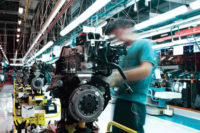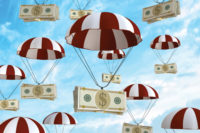The brightest of the stars in Canis Major (the big dog) is Sirius, which also happens to be the brightest star in the night sky. In the summer, however, Sirius, the “dog star,” rises and sets with the sun.
Sliding into a second recession?
This summer I think we could have used “dog days” to describe the state of the economy and just as the ancients saw things differently, so do economists, politicians and pundits worldwide.
From the highly unusual virulent debate about raising the debt ceiling and downgrading of our debt by S&P to financial crises in many European countries to dramatic swings in the stock market, the struggling recovery from the 2008-9 recession seems to be in jeopardy.
“Recession is not inevitable, but I think there’s better than a 50-50 chance now.” That mid-August assessment came from Bill Gross, the respected investment chief at bond fund giant Pimco, based in Newport Beach, CA.
World stock markets are reeling, and a new forecast by Morgan Stanley said the United States and Europe were “dangerously close” to lapsing back into recession.
In the meantime, as unemployment hovers in the 9% range, politicians from both parties are wasting time arguing about who caused the problem rather than working toward solutions.
In what appears to me to be a contradiction, while many want government to get out of the way and let the private sector create new jobs, others are clamoring for President Obama to come up with new plans for doing just that.
Sitting on the sidelines
As for the large corporations who could add jobs, most are sitting on hoards of cash, buying back stock or making acquisitions (which usually lead to layoffs).
According to a recent report, as of March 31 companies in the S&P 500 index were sitting on nearly $1 trillion in cash, a record sum. But as Gregory Daco, chief economist at HIS Global Insight says, “These companies are looking to reach certain targets and one way to reach them is to cut down on labor costs.”
And smaller entities, having successfully navigated the last recession, are very cautious about adding expenses during a shaky recovery.
An example is Ross Riddle, president of South Coast Shingle in Long Beach, CA. Although the company is in the black for the first time in a few years, he is fearful of adding new employees, even though he would like to and business is strong following the wet winter. He still can’t forget those days when the bursting of the housing bubble nearly brought business to a halt.
For the same reason, he is reluctant to buy new trucks and forklifts, though in the past he would buy one of each annually. I guess we could say that is the result of the trickle-down economy, although I don’t think that is what the proponents of that theory have in mind.
Herb is bullish
Here in California, with one of the nation’s highest unemployment rates at 12.1%, we have a mixed bag. Some areas are doing quite well, notably bio-tech, technology and energy. On the other hand, the real estate bust continues to be a drag on the recovery and budget cuts in the public sector have forced local governments to shed workers.
For all the doom and gloom — and there are plenty of reasons for it — it doesn’t seem to me another recession is likely. While I am no expert, my sense is the strength of the energy sector will sustain us until there is more stability in the global economy, the domestic real estate market improves and some real jobs programs emerge from the political debate.
Part of my optimism rests with a report that construction employment climbed in July, hitting a 15-month high, according to the Associated General Contractors of America.
At the same time, there is a legitimate concern that budget cuts could limit continued improvement as construction projects such as highways and military bases might be halted, according to Ken Simonson, chief economist of the group.
Simonson does go on to add: “Overall job creation will remain sluggish at best unless single-family home building also revives.”
So who knows how this will turn out?
Time will tell and for now I will give Daco the last word: “It’s sort of this chicken and egg problem. We are at a point where companies will only hire individuals if they absolutely have to. They would rather ask someone to work a little more in this environment when people aren’t spending.”








